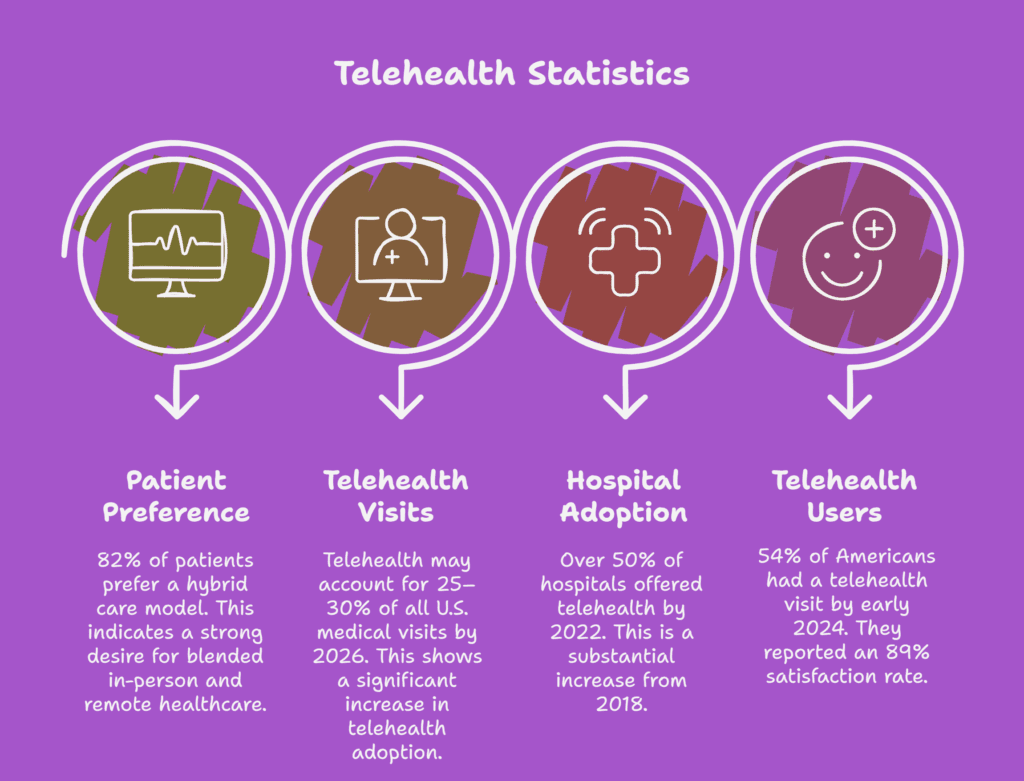The Emerging Role of BPO in Hybrid Healthcare’s Future
13 Aug 2025 By: Maria Rush
Updated
What Is a Hybrid Healthcare System?
Hybrid healthcare is a care model that combines telehealth visits with in-person appointments, using shared systems so patients and providers can move between both smoothly. It matters because it adds convenience for patients and helps clinics use staff time and resources more efficiently. For example, a post-surgery follow-up can happen by video, while a first-time exam stays in person. BPO teams often support this by handling scheduling, calls, and follow-ups so nothing gets missed.

Why Hybrid Healthcare Matters Now
Hybrid healthcare is already part of how care happens today. Patients want options. Providers want efficiency. And the system needs something that works for both.
Some days, a quick video call is perfect. Other days, nothing beats sitting across from your doctor. The trick is making both work together. And this is where BPO teams come in. When you’ve got a partner handling patient questions, appointment scheduling, and all those follow-ups, your medical team gets to focus on the patient, not the paperwork.
Making Telehealth and In-Person Care Work Together
Hybrid care only works if the moving parts actually connect. One scheduling system. Virtual waiting rooms that feel natural. Medical records that update instantly, no matter where the visit happens. And knowing exactly which visits can be virtual and which can’t.
The Veterans Health Administration has been quietly doing this for years. And behind the scenes? BPO teams making sure calls are answered, follow-ups are booked, and nothing slips through the cracks.
The Tools That Keep Hybrid Care Going
- EHRs & Patient Portals: One spot for scheduling, results, and telehealth links.
- Telehealth Platforms: Reliable and connected to what you already use.
- Virtual Assistants: Ready to answer questions and guide patients.
- Remote Monitoring Devices: Track health without constant trips to the clinic.
- Automation Tools: Offload repetitive admin work.
- Cloud Systems: Keep everyone working with the same information.
What’s Happening in Hybrid Care Right Now (2025)
Telehealth is now part of the plan and not just a back-up anymore. In mental health, nearly 4 in 10 visits are now virtual. Remote monitoring for conditions like diabetes and heart disease is climbing fast. Providers are mixing virtual and in-person visits to keep patients engaged without burning out their staff.
Where Hybrid Healthcare Is Headed
By 2030, as much as 25% of U.S. healthcare visits could be virtual. Expect more hospital-at-home setups, smarter decision-making tools, and better access for rural communities. The ones who get ahead now, especially with the right BPO partners will be ready for what’s next.

How BPO Supports Hybrid Care in Practice
- Patient Intake & Communication
- Virtual Medical Assistants
- Revenue Cycle Support
- Tracking & Reporting
- Performance-Based Partnerships
Staying Compliant and Secure
Healthcare doesn’t allow for “close enough.” HIPAA compliance, data protection, and accountability are non-negotiable. Offshore teams should know U.S. privacy rules and have the right certifications.
What This Looks Like in Real Life
- Virtual triage that keeps ERs from overflowing.
- Faster billing cycles.
- Chronic care programs that keep patients healthier.
Choosing the Right BPO Partner

Don’t just look at price, look at fit. Can they handle your systems? Keep data safe? Scale with you? Will they feel like part of your team, not just a vendor?
A good BPO partner in hybrid healthcare is like a steady co-pilot. Ready, capable, and focused on the destination.
Building the Right Team
A good BPO partner isn’t just about filling seats. They bring trained people who understand patients, can work across time zones, and stay consistent through busy seasons.
Conclusion
If you’re reading this and thinking, “We could really use help making all these moving parts work together,” then it might be time to have a conversation. You don’t need a sales pitch. You just need to see what’s possible when you’ve got the right BPO team in your corner. One that understands healthcare, respects patient privacy, and knows how to keep the virtual and in-person sides of care running smoothly.
Talk to us and let’s see what we can build together.


